GYMNASTICS IN CHINA
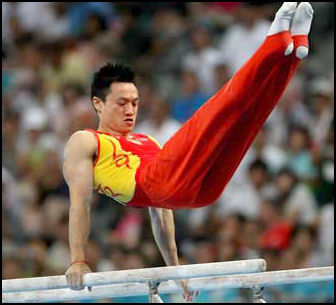
Yang Wei in 2008 There are 14 gymnastics events: six for women (the vault, floor exercise, uneven bars, balance beam, individual all-around and team competitions) and eight for men (the vault, floor exercise, parallel bars, high bar, pommel horse, rings, individual all-around and team competitions). In the team competition the strongest three gymnast on each team compete head to head in each event.
Gymnasts usually perform routines that they have worked out and practiced over and over again for months or even years. Mistakes are often the determining factor on who scores well and who doesn’t. An American coach said, “At the Olympic level, gymnastics becomes more mental than physical. With so much pressure, so many little things can go wrong.”
A lot of emphasis is put on the landing of the dismount. Ideally gymnasts should land with their feet well-planted and the body straight in the “ta-dah!” position, without taking any steps. Most gymnasts take a step when they land to maintain their balance. Large deductions are made for a totally botched dismount. Other big mistakes included falling off the apparatus. Less severe but still costly is stepping out of bound on the floor exercise.
Powerhouses in men's gymnastics include China, Russia, the United States, Japan, Belarus, and the Ukraine. Powerhouses in women's gymnastics are Russia, Romania, the Ukraine, the United States, and China.
The ancient Chinese, Greeks, Indians and Persians practiced forms of tumbling and acrobatics to prepare for battle. China has a long history of practicing acrobatics. Many forms of Chinese martial arts are arguably more about gymnastics and acrobatics than fighting.
Gymnasts chalk their hands before competing to decrease friction. The chalk enables the gymnast to get a good rotations and keep their grip while preventing the skin from coming off their hands.
Female gymnasts often stay loose during competitions by lying face down on the floor and letting their team mates walk all over them.
See Articles Under OLYMPICS factsanddetails.com ; Chinese Olympic Committee en.olympic.cn ; China’s Olympic History china.org.cn ; Book: “Olympic Dreams: China and Sports, 1895-2008" by Xu Gouqi
Gymnastics Scoring
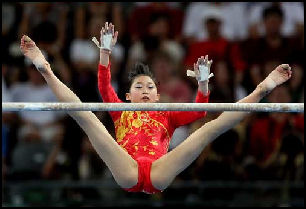
Jiang Yuyan The gymnastics scoring system was radically changed in 2006. There is no longer a single number for perfection. No more perfect 10s. Instead a final score is reached by adding the “difficulty score” to the “execution score” and subtracting “neutral errors.” Two judges are responsible for reaching a consensus on the “difficulty score.” Six judges judge the execution and make deductions for errors, The highest and lowest scores are dropped. Scores above 17 are excellent and rare. A score above 16 is very good.
The “difficulty score” is obtained by taking the total value of the 10 most difficult moves with easy moves having a value of 0.1 and the most difficult having a value of 0.7 for woman and 0.6 for men. Points are added for completing required elements and for stringing together difficult moves. Composition points can be deducted for omitting certain skills the judges want to see. The “execution score” takes into consideration artistry and technique. Points are deducted for errors, from 0.1 for a small mishap to 0.8 for a fall, and stepping out of bounds and time violations.
Chinese Gymnastics
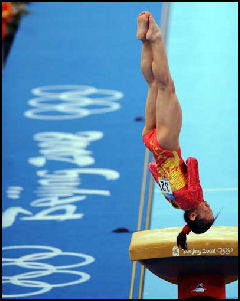 The training, painful stretching exercise and muscle-building exercise that children in the national gymnastics program is said to be particularly severe. Zhao Hanhua, a top gymnastics coach at the Wuhan Institute of Physical Education, told the New York Times: “Gymnastics is a really painful thing, especially for pretty young kids; it’s torture. So we tell the kids, “This is your lifetime challenge.”
The training, painful stretching exercise and muscle-building exercise that children in the national gymnastics program is said to be particularly severe. Zhao Hanhua, a top gymnastics coach at the Wuhan Institute of Physical Education, told the New York Times: “Gymnastics is a really painful thing, especially for pretty young kids; it’s torture. So we tell the kids, “This is your lifetime challenge.”
The mother of Olympic medalist Cheng Fei told the New York Times, “The training was pretty tough, especially during the leg stretching. She cried crazily, like she was dying. Her father and I accompanied her and our hearts almost broke into pieces when she cried that heart-wrenchingly.” When Cheng Fei said she wanted to quit, he mother said, “We asked her to hold on because we had invested so much and lived so bitterly...Our family was poor so we hoped Cheng Fei could in some way change her life.”
In the mid-1990s, 4-foot-1-inch Chinese gymnast Mo "Mighty Mouse" Huiland and her team mates endured very tough training sessions. After eight-hour-a-day workouts left her hands bleeding gymnast Mo wrote a letter asking if the training regime could be cut back. "I don't know what it takes to a gymnast," she wrote.
Li Ning, Nike and Adidas
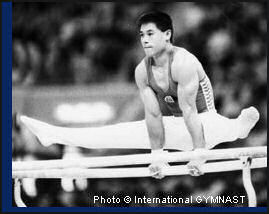
Li Ning Li Ning is regarded as the best Chinese gymnast of all time. Born in 1963 and known in China as the “prince of gymnastics,” he won six medals at Los Angeles in 1984, including three golds, in floor exercises pommel horse and rings. When he retired in 1988 he had 14 world championship, World Vup and Olympic titles but was dismissed and ridiculed when he failed to win a medal in Seoul in 1988
Today Li is a very rich man. He started his sportswear company in 1990 and named it after himself. As of 2008, the company had 4,100 stores operating in China. Li was the final torch bearer, lighting the Olympic flame above the Bird’s Nest stadium, at the Olympics in Beijing in 2008.
Li Ning won six medals in gymnastics at the Olympics in Los Angeles in 1984, including three golds. One of the best known athletes in China in the 1980s, he founded a sporting goods company that bears his name. Li Ning Co. Ltd is the largest Chinese-owned sportswear company in China and was the largest sportwear company in China period before the arrival of Nike and Adidas. It is now third behind Nike and Adidas.
Li was able to sign Shaquille O’Neal to a sneaker contract and is now estimated to be richer than Tiger Woods.

Li Ning Damon Jones shoe
One of the most popular players and biggest pitchman in China is Damon Jones, a journeyman guard with Cleveland Cavaliers who has played for more than a dozen teams and has a career average in the NBA of 6.8 points. He has a two-year endorsement deal with Li Ning in which he is paid an annual salary of between $200,000 and $300,000, plus bonuses.
Jones was chosen by Li Ning because he was considerably more affordable than big name NBA stars; he has a winning smile and lot a charisma; and he plays on the same team as LeBron James, whose games are widely shown on Chinese television. Negotiations on his contract were tough. There were disputes on almost every point. In the end he was able to get first class air tickets on all his flights between the United States and China. Li Ning scored a major coup when Jones made a last second shot that won a play-off series for the Cavaliers. The shot, made wearing Li Ning shoes, was shown over and over on Chinese television.
Li Xiaoshuang
China's Li Xiaoshuang won the gold medal in the men's gymnastic all around in the 1996 Summer Olympics in Atlanta. He beat his rival, Alexei Nemov of Russia, by only .049 points, and made amends for a mistake on the rings that cost the Chinese team the gold medal in the team event. After Li won the gold his coach said, "Gold medals are extremely important for us. They reflect the spiritual appearance of the state."
Known among his team mates for his daring moves, Li is 1.6 meters tall and weighs 56 kilograms. The son of shiploader and shoe-factory laborer, he is from Xintao, a small village near the Yangtze River in Hubei province. He and his identical twin brother were discovered when they were six by a gymnastics coach who saw them playing outside of a movie theater. Li made the national team at the age of 15. He roomed and trained with his brother.
In the 1992 Olympics, Li won a gold medal in the floor exercise, a bronze medal in the rings and a silver medal in the team event, making him the most decorated Chinese athletes at the Barcelona summer games. After returning home he won government and corporate endorsement contacts worth $100,000 and frequently appeared on television and in magazines pitching water-purifying filters and sportswear. Li sends his parents $100 a week but is angry that state sport authorities take half his earnings.
Sang Lan, Paralyzed Gymnast
In July, 1998, 17-year-old Chinese gymnast Sang Lan fractured and dislocated two vertebrae in her neck when she over-rotated on a somersault and landed headfirst in a practice vault at the Goodwill Games in New York. Observers said they heard the sound of the fractures. Afterwards she laid on the mat unable to move below her chest.
Sang’s coach moved the springboard in a misguided attempt to help her. Sang ran at full speed. No spotter was on hand to help her landing. A Romanian coach said, “I heard a bad sound: a crack.”
During a seven-hour operation, vertebrae in her neck were fused but she remained paralyzed from the chest down. Among the celebrities who visited her at the hospital were Celine Dion, then-Vice President Al Gore and his family, George Bush, Jackie Chan, Christopher Reeves and Leonardo DiCaprio. She assisted Rudolph Giuliani lower the Time Square ball for New Year.
Sang spent 10 months in rehabilitation in the United States. Her doctor told the New York Times, “In contrast to many people with such devastating injuries, I can’t recall that she ever appeared depressed, angry or blamed anybody or anything for her injury.”
When Sang was released from the hospital a few months after the accident, she couldn't move her fingers or her body from the chest down but she could raise her arms over her head and was able to use a motorized wheelchair. She is convinced that one day she will be able to walk. After returning to China Sang moved into an apartment with her mother across the street from a hospital where she receives physical therapy. Her goals she said were to gain admission to a university and get a job.
Today Sang Lan is paralyzed from the chest down. He body is thin and frail, she spends most of her time in a wheel chair, She has difficulty using her hands, which are clutched permanently into loose fists. She can’t hold a cup, pick up a pen, take a pill from a bottle or dress herself. To use a computer keyboard she has sticks attached to her hands. Despite this she is surprisingly upbeat and not bitter, “I don’t feel anything bad,” she told the New York Times. “I learned to face reality from the beginning. Sometimes when I watch old videos of me flying in gymnastics, I’m proud that I used to be that good.”
Sang graduated from Peking University with broadcasting degree in 2007 and for a while was news media figure. When she attended classes friends carried her up and down stairs. She was unable to tale notes. Her large pens falls away when her hand starts to spasm. She is looked after by a caretaker and a personal assistant, provided by China’s General Sports Administration. In 2006 she hosted a television show called “Sang Lan’s Olympics.” As of 2008, she was hosting an interview program on one of China’s leading web portals and served as a guest journalist for the Chinese Olympics Committee. She covered the Olympics at both Athens in 2004 and Beijing in 2008.
In June 2007, Chinese gymnast Wang Yan was paralyzed after a horrific accident in which she fell head first from the uneven bars and broke he neck during national championships in Shanghai. Doctors said her injury was so severe she was lucky to be alive.
Sang Lan filed a $1.8 billion suit against Time Warner and the U.S. Gymnastics Federation, saying they and others broke promises to take care of her after her accident and took out inadequate insurance for the event and blamed this on her worsening condition that has occurred because she is unable to get proper treatment. According to the lawsuit, Sang was left paralyzed from the mid-chest down after she fractured and dislocated two vertebrae and injured her spinal cord when someone walked into the vault area after she pushed off from the vault and removed a mat before she landed. Hai filed a lawsuit earlier this year in U.S. District Court in Manhattan seeking $1.8 billion on Sang's behalf. He named as defendants AOL Time Warner Inc., USA Gymnastics, TIG Insurance Co., TIG Specialty Insurance Solutions, Riverstone Claims Management LLC and various other defendants. USA Gymnastics said in a statement: "USA Gymnastics was never served in the lawsuit and is being dismissed from the suit. This matter has been resolved through the insurance carriers, and we hope the settlement will assist Sang Lan in the coming years."
A deal was reached with insurance companies and USA Gymnastics to provide Sang Lan with medical care and rehabilitation in China, along with financial help, her lawyer announced in July 2011. AP reported: “The lawyer, Ming Hai, said he could not divulge details of the deal. Still, he said it will provide up to $10 million in cash and health care over the lifetime of the 30-year-old gymnast.” "Once again, when she's in trouble, the American people step forward and help her. It's great because this is what America's all about," Hai said.
Chinese Men's Gymnastics
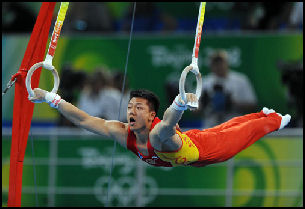
Chen Yibing 2008
China won its third consecutive men’s world gymnastics championship in 2007. It was also the seventh time in the last eight world championship that China won. Chinese men also won gold medal in the World Gymnastic Championship in 1995, 1996 and 1997.
Chinese men won the team all around in the 2000 Summer Olympics in Sydney and took a silver medal at the 1996 Olympics in Atlanta. In Sydney Yang Wei took a silver in the individual all around; Li Xiaopen won a gold in the parallel bars; and Liu Xuan won another gold. Afterwards Liu went to college and became a pop singer
In 2001, in his first major competition, 16-year-old Feng Jin became the youngest men’s all-around world champion, edging Belarus veteran Ivan Ivankov. He claimed victory in the last event after the leader Sean Townsend of the United States fell twice of the high bar.
Teng Haibin won the gold medal in the pommel horse at the 2004 Summer Olympics in Athens.
As of 2007, Yang Wei had won six gold medals in men’s world gymnastics championships. He won the all-around in 2007 despite taking a nasty fall and rolling completely off the mat in the all-around competition.
Gymnastics at the 2008 Beijing Olympics
Chinese gymnasts won a record-tying nine of 14 gold medals in gymnastics and took three out four of the most prestigious events: the men’s and women’s team competition and the men’s individual all-around. The only one they missed was the women’s all-around. Before the Games, the Chinese gymnastics ahead coach Huang Yin said, his squad would “jump off the highest building” if they won only one gold medal.
China won a silver medal in the rhythmic gymnastics team competition. It was China’s first medal in rhythmic gymnastics.
Chinese Men’s Gymnastics at the 2008 Beijing Olympics
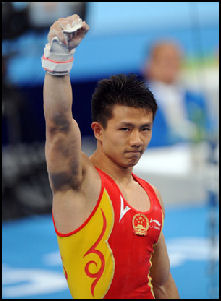
Chen Yibing The Chinese men’s team in 2008 was comprised of Yang Wei, Xiao Qin, Li Xiaopeng, Zhou Kai, and Chen Yibing. The Chinese men’s team was undefeated in world competition after the Athens Olympics in 2004
In 2004 Olympics, the Chinese men choked. Defending world champions and strong favorites, they had been the strongest team for almost a decade, winning seven of eight world championships. Instead of dominated in Athens they collapsed, making a number of egregious mistakes: one slipped on the parallel bats, another fell on the high bar and two stepped out of bounds on the floor exercise. They went home with only two medals, one of them gold, and finished fifth in the team event.
The Chinese men made up for the dismal showing in Beijing. They won all but one event — the vault in which there was no Chinese finalist — finishing with seven gold medals, including the team gold medal, and one silver medal.
In the team competition, the Chinese men got off to a shaky start, with none of the gymnasts nailing their final moves in the floor exercise and were in sixth place. After that they came on strong, with different gymnasts delivering top scores in five of the six events, with a total score of 286. 125, finished convincingly ahead of defending Olympic champs Japan, who had 278.875.
The Chinese gymnast did the most difficult routines in every event. For other gymnast to challenge they had to be flawless in their routines and count on the Chinese to make major mistakes. Sally Jenkins wrote in the Washington Post, “For pure awe, no one could equal the gold-medal-winning Chinese. National heroes, Yang Wei, Xiao Qin and Li Xiaopeng and their teammates turned in performances that were full of soaring eye tricks and brought cheers that sounded like great exultations from the crowd...There were flying twists, spinning and miraculous catches, followed by a perfect stillness that bespoke their strength and meticulous execution. The starting value of their routines — the measures of difficulty — was so high that no one ever really had a chance to beat them.”
Yang Wei at the 2008 Beijing Olympics
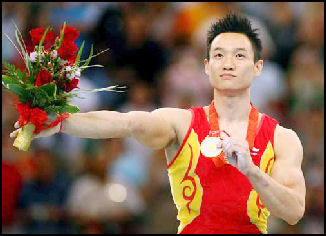
Yang Wei Yang Wei won a gold medal in the all-around and a silver medal in the rings at Beijing in 2008. At 28 he was one of the biggest sports stars in China and the year before he was the first man in 81 year to win two all-around world championships back to back. At the Olympics in 2008 he made a few misstates — he slipped out of bounds on a landing in the floor exercise — and did a very conservative routine on the high bar, his weakest event, but had build up enough of lead with his high difficulty routines it didn’t matter. After winning the gold he said he hoped his achievement would be an inspiration to China’s youth who he described as “lost” and without direction.
The gold was big personal victory for Yang who had been expected to won the gold in the all-around in the previous two Olympics but didn’t. He said, “If I couldn’t win the gold then, I thought I could never get gold; extra training would not have an effect. But my coach, Huang Yubin, kept encouraging me...and told me that the 2008 Games would be the greatest chance in 100 years.” Yang admitted that he felt panicked before the competitions but harnesses his years of experience to calm down and focus.
With spiked, gelled hair Yang came across as cocky in the competition . He started off slow gaining momentum as the competition went on. He was trailing after the first two events and was second after the third. He was catapulted into first place in the vault with an extremely difficult vault — a flip with three twists. Throughout the competition the crowd chanted “Yang Wei is great.”
Yang is known for doing challenging routines with a high degree of difficulty but is also known for making mistakes, often on very simple moves, when the pressure is on him. A silver medalist at Sydney in 2000 in the all-around, he had commanding lead in the all-around at Athens in 2004 but finished out of the medals when he fell from the high bar. After that Olympics he apologized to the nation and said he considering retiring. He fell from the bar against at the world championships in Stuggart in 2007 but still won the all-around anyway because he had built up such a huge lead in the other events. He didn’t fall off in Beijing.
Yang is a member of China’s National People’s Congress, an honor he received for his two world titles. After the Beijing Olympics he married former gymnast Yang Yin, who won two bronze medals in Sydney. Press releases said the couple planned to have “a romantic wedding by the sea.”
Chinese Men’s Gymnastics Individual Events at the 2008 Beijing Olympics
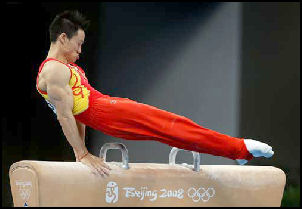
Yang on the horse In Beijing, Zou Kai won two gold medals, in the high bar and floor exercise; Li Xiaopeng won a gold medal in the parallel bars; and Chen Yibing won a gold medal on the rings.
Xiao Qin won a gold medal in the pommel horse. He was the favorite in Athens in 2004 when he was known as “King of the Pommel Horse” but fell during qualifying a failed to advance to the finals and was dubbed “King of the Floor.” He redeemed himself by winning the 2007 world championship.
After wining the gold in Beijing, Xiao said, “I left home when I was little. It was always very hard and I’ve encountered a lot of difficulties on my way here. Four year ago my mistake caused the team to lose a medal...I criticized myself a long time.”
One wire service reporter wrote: “Xiao Qin had the crowd oohing and aahing, his hands a blur, his body a perfect plane. Not even a sliver of light was viable between his legs and his every move was performed with perfect control. When he finished, he pumped his fists at the crowd, smiling broadly at his teammates.”
Chinese Women’s Gymnastics at the 2008 Beijing Olympics
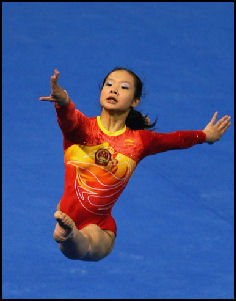
Cheng Fei Chinese women won six gymnastics medals, two less than the United States, but took the coveted team gold medal. It was the first Olympic gold for the Chinese women. In the past the men had always performed well but not the women, who finished a disappointing seventh in the team competition in Athens in 2004 and won their first world title in 2006.
The Chinese team was comprised of Yang Yilin, Deng Linlin, Jiang Yuyuan, He Kexin, Li Shanshan and Cheng Fei The United States women were favored in the team event but not by much. They were defending world champions while the Chinese had won the time before that, with each team winning by less than a point.
American team captain Alicia Sacramone stumbled badly in both the balance beam and floor exercise, costing the U.S. gymnasts their chance for gold. On the balance beam she messed up on her mount. Some have insisted that an unusually long and unexplained delay before her routine caused her to faulter and some even went as far as to say the Chinese were behind the delay. Sacramone wasn’t the only one who messed up. American stars Nastia Liukin and Shawn Johnson landed out of bounds in the floor exercise.
The Chinese Gymnast by contrast performed with precision and skill and avoided making any major mistakes. Deng Linlin, Jiang Yuyuan and Cheng Fei were particularly delightful to watch in the floor exercise which they performed when the team title was already pretty much sewn up. A brief opportunity opened for the United States when Li Shangshan fell off the balance beam but that was quickly followed by Sacramone’s stumbles.
Liang Qiao (known as Chow), a Beijing native and former gymnastics champion, coached American gymnast Shawn Johnson, who won a gold in the balance beam, three silvers, in the floor, all-around and team events. Chow was never an Olympian but he spent 12 years on the national team and won more than 30 international medals. He moved to Iowa in 1991 and helped coach a gymnastics team there while he learned English. Later he opened a gymnastics school, Chow’s Gymnastics and Dance Studio, with his wife, also a former Chinese gymnast, in 1998 and began coaching Johnson soon after the school was opened when she was six. Liang and Johnson stayed together through Johnson’s Olympic success.
Other successful Chinese gymnasts that have set up gymnastics schools in the United States include Lu Li, an Olympic gold medalist in the uneven bars in Barcelona in 1992, who runs a school in Fremont, California called All-Around Champion; Li Yuejin, China’s first ever world champion gymnast and 1982 men’s floor exercise world champion, who works as a coach in Las Vegas with his wife, Wu Jianu, also a national team member. Samantha Peszek, a member of the 2008 women’s’s U.S. Olympic team, was coached by Chinese-born Xueyi (Peter) Zhao in Fischers, Indiana.
Chinese Women’s Gymnastics Individual Events at the 2008 Beijing Olympics
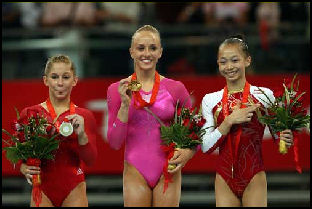
Johnson, Liukin, and Yilin He Kexin won a gold medal in the uneven bars. Yang Yilin won the bronze in the all-around behind Americans Nastia Liukin and Shawn Johnson, and a bronze in the uneven bars.
Cheng Fei won two bronze medals in the balance beam and vault. Coming into the Olympics she was a three time world champion in the vault and one of the few female gymnast who was able to perform a Yurchenko, with 2½ twists, and has another move named after her. Adapted from moves she learned from a male gymnast, the Cheng Fei vault involves doing a round off with a half twist onto the vault followed by a flip with 1½ twists in the lay-out position.
At 20 Cheng Fei was the veteran of the team. The daughter of sports enthusiast, she had been groomed to be a sports star since she was three, when her parents took her to a table tennis training center. After she showed little interest in ping pong she was taken to a top gymnastics coach who said she had promise. Her coaches said she was an extraordinarily hard worker at an early age. At the age of five she won her first competitive medal. At seven she entered a national sports program in Wuhan, At 12 she made it the national team. She competed in Athens in 2004 at the age of 16 but failed to medal.
In the women’s individual all around, Yang Yilin entered the final event, the floor experience, in second place, behind Liukin and ahead of Johnson. Yang made some costly mistakes on the floor exercise, taking the bronze while Liukin and Johnson nailed their routines and took gold and silver receptively.
He Kexin won the gold medal in the uneven bars and Luikun won the silver despite the fact they finished with the same scores. Based on a new tie breaking system He was given the gold medal because she had a lower average of deductions. The margin between the two gymnasts was infinitesimally small, 0.033 points. Afterwards He said, “I didn’t expect to win a gold medal because the more I want to, the more pressure I feel.”
Even though she won a bronze medal on the balance beam and a gold medal in the team event all Cheng Fei could talk about was the mistake she made in the floor exercise, “When I was a beginner, it was normal for me to make mistakes. But I persisted for four years just for these Games, so when I fell on Sunday it was unimaginable for me . I feel totally empty...I don’t have my soul anymore, and I am only left with my body.”
Chinese Gymnast's Age Controversy at the 2008 Beijing Olympics
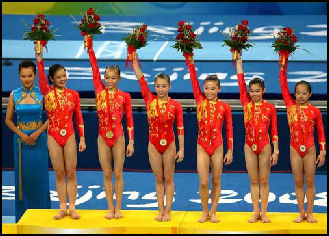
Chinese women's team Several of the Chinese gymnasts looked considerably younger than 16, the age limit for Olympic gymnasts. All but one of the gymnasts were listed as 15 or 16 and all but one weighed less than 80 pounds. Most of the attention was forced on He Kexin, listed as 16, four-foot-8 and 73 pounds, Jiang Yuyuan, 16 and 71 pounds, and Yang Yilin, 15 (with a birthday allowably two days after the Closing Ceremonies).
The age limit in gymnastics is 16 with the 16th birthday taking place in the calendar year of the Olympics. Female gymnast under 16 have an advantage, gymnastics coaches say, because they are lighter, more fearless, easier to coach and can perform more acrobatic moves because their center of gravity is a lot higher.
The Chinese women gymnasts provided ample fodder for late night talk show jokes. Bela Karolyi, the former coach of Nadia Comaneci and Mary Lou Retton, accused China of “dirty cheating,” saying, “They are obviously kids — 12 or 14, max — and you’re telling the world they are 16" What arrogance!” Criticizing the use of passports and other documents as a proof of age he said, “The passport is made by the Chinese government. They can do any kind of documents.” He asserts that he wasn’t criticizing the Chinese. His suggestion was to drop the age requirement.
He and Jiang possessed passports that said they were 16 at the time of the Olympics, but records’sports registration lists — posted on official websites and dug up by Western journalists said that both the girls were just 14. The websites and bulletin boards discussing the age issue were shut down after the New York Times and Los Angeles Times reported on them. Chinese officials later said that a simple paperwork error was reason for the age discrepancy: the wrong birth date was written on sports registration forms.
On the controversy, He Kexin said, “I don’t get upset because I have answered this question many times, there’s no need to explain anymore.” At a press conference after winning the team gold, she said, “My real age is 16. I don’t care what other people say. That’s none of my business. I want people to know that 16 is my real age.”
A 5½ week investigation by the international gymnastic federation (FIG) determined that girls on the women’s gymnastics team were old enough to compete. According to a FIG report released in October 2008, “Originals of official documents received from the Chinese Gymnastics Association, specifically passports, identity cards and family booklets or Household registers, confirm the age of the athletes.” Many journalist feel that the FIG should have done a more in depth investigation — visiting the home town of the athletes to perform interviews with neighbors and teachers — and felt accepting Chinese government documentation was accepting documents from the people accused of cheating.
Doubts remained however about China’s bronze-medal-winning team in Sydney in 2000, particularly the gymnasts Dong Fangxiao and Yang Yun, who may have been 14 when they competed, they became the subjects of another investigation. In an interview with Chinese television in June 2007, Yang said, “At the time I was only 12, I thought that if I failed this team I’ll do it again next time. There’s still hope.”
An investigation by the FIG, the international gymnastics body, found that gymnast Dong Fangxiao was 14 when she competed on the Olympics in Sydney in 2000 and recommended that her bronze be taken away. Another gymnast on the team was suspected to being underage but there was not enough evidence to support the claim to punish her.
In 2010, Dong Fangxiao was stripped of her 2000 Olympic bronze medal after an investigation by FIG determined that her birth date had been falsified for the 2000 Olympics so she compete despite being under the age limit. She had registered different ages at the games at Sydney in 2000 and Beijing in 2008.
After the 2008 Beijing Olympics
At the world championships in London in October 2009 the Chinese won six gold medals and nine total medals without even entering some events such as the men’s all around. Three women and two men on the team were at Beijing in 2008. All of the others were newcomers,.
He Kexin won the gold in the uneven bars at the gymnastic World Cup in Madrid in 2009.
At the World Championship in Rome in 2009 Guo won two gold medals.
Chinese Gymnastics Judge Guilty of Changing Score
In August 2011, AP reported: “A Chinese gymnastics official has been found guilty of fraud after he falsified a score to help a Chinese athlete win gold at the 2010 Asian Games. The International Gymnastics Federation says it downgraded Shao Bin's status as a judge and ordered him to pay $8,800 in legal costs. He can appeal the sanction by Sept. 9. [Source: Associated Press, August 31, 2011]
Chen Yibing, “Lord of the Rings,” won an Olympics gold medal in Beijing and captured his forth world title in October 2011.
Shao worked on a panel evaluating the difficulty of routines in the men's floor exercise final in November at Guangzhou, China.The international federation says Shao "altered an execution score prior to posting" without telling event officials. The altered mark moved Chinese gymnast Zhang Chenglong from second into a tie for first place with Kim Soo-Myun of South Korea.
Image Sources: Beijing Organizing Committee for the Games of the XXIX Olympiad Official website, Xinhua, Getty Images
Text Sources: New York Times, Washington Post, Los Angeles Times, Times of London, National Geographic, The New Yorker, Time, Newsweek, Reuters, AP, Lonely Planet Guides, Compton’s Encyclopedia and various books and other publications.
Last updated October 2011
